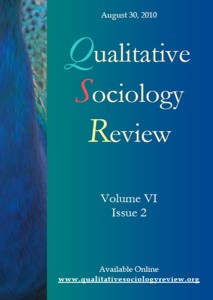Narrative Approaches as a Supplementary Source of Knowledge on Marginalized Groups
DOI:
https://doi.org/10.18778/1733-8077.6.2.06Keywords:
Narrative approaches, Autobiographies, Youth in care, Youth in gay and lesbian familiesAbstract
This article reflects upon two different research projects that involve narratives from youth in care and youth growing up in families with gay and lesbian parents. We argue that these narrative approaches may offer a supplementary source of knowledge on marginalized groups that often seem hard to reach. The first method involves the participant and researcher collaborating to convert an oral narrative into a written one. In the second, the participants write an autobiographical narrative by themselves, covering themes specified by a researcher. The article is structured so that we first look at the processes of co-creating narratives and collecting autobiographical testimonies. We then introduce the two different methodological approaches by referring to empirical examples. Finally we reflect on the methodological and ethical challenges that occurred during this research.
Downloads
References
Bauman, Richard (1987) Story, Performance and Event. Contextual Studies of Oral narrative. Cambridge: Cambridge University Press.
Google Scholar
DOI: https://doi.org/10.1017/CBO9780511620935
Bruner, Jerome (1986) Actual minds, possible worlds. Harvard: Harvard University Press.
Google Scholar
DOI: https://doi.org/10.4159/9780674029019
Denzin, Norman K. (2000) "Preface" Pp xi-xiii in Lines of Narrative: Psychosocial perspectives, edited by M. Andrews et al. New York: Routledge.
Google Scholar
Fog, Jette (1994) Med samtalen som udgangspunkt. Det kvalitative forskningsinterwiev. København: Akademisk Forlag.
Google Scholar
Follesø, Reidun (2006) Sammen om barnevern. Enestående fortellinger felles utfordringer. Oslo: Universitetsforlaget.
Google Scholar
Gilmore, Leigh (1994) "Policing Truth: Confession, Gender and Autobiographical Authority" in Autobiography & Postmodernism, edited by K.Ashley, L.Gilmore, G. Peters. Boston: The University of Massachusetts Press.
Google Scholar
Hanssen, Jorid K. (2007) "Homoseksuelle foreldre – (u)vanlige familier?" Dansk Sociologi nr.2/18.
Google Scholar
Hanssen Jorid K.(work in progress) Erfaringer fra å vokse opp med homoseksuelle foreldre (preliminary title). Work in progress, Faculty of Social Sciences. Bodø: University College.
Google Scholar
Haraway, Donna J. (1991) "Situated Knowledges: The Science Question in Feminism and the Privilege of Partial Perspective". Pp 183-201 in Simians, Cyborgs and Women. The Reinvention of Nature, edited by D.Haraway. London: Free Association Books.
Google Scholar
Hill, Malcolm, John Davis, Alan Prout and Kay Tisdall (2004) "Moving the Participation Agenda Forward." Children and Society 18:77–96.
Google Scholar
DOI: https://doi.org/10.1002/chi.819
Hine, Jean (2009) "Young people’s lives: Taking a different view" in Work with Young People edited by J.Wood & J. Hine. London: Sage.
Google Scholar
Hydén Lars Christer (2008) "Narratives in Illness: A Methodological Note". Qualitative Sociolgy Review IV (3).
Google Scholar
DOI: https://doi.org/10.18778/1733-8077.4.3.04
Hydén, Lars Christer (1997) "De otalliga berättelserna" in: Att studera berettelser, edited by L.C.Hydén and M. Hydén. Stockholm: Liber.
Google Scholar
Kellett, Mary, Ruth Forrest, Naomi Dent and Ben Ward (2004) "‘Just Teach Us the Skills Please, We’ll’ Do the Rest: Empowering Ten-Year-Olds as Active Researchers", Children and Society 18 (5) pp. 329-343 http://oro.open.ac.uk/671/
Google Scholar
DOI: https://doi.org/10.1002/chi.807
Laslett, Barbara (1999) "Personal Narrative as Sociology". Contemporary Sociology 28: 391-401.
Google Scholar
DOI: https://doi.org/10.2307/2655287
Linell, Per (2005) The Written Language Bias in Linguistics. London: Routledge.
Google Scholar
DOI: https://doi.org/10.4324/9780203342763
Lundberg, Ingvar (2005) Utsatta flickor och pojkar En översikt av aktuell svensk forskning Stockholm: Forskningsrådet för Arbetsliv och Socialvetenskap.
Google Scholar
Plummer, Ken (2005) Documents of life 2. London: Sage Publications.
Google Scholar
Polkinghorne, David (1988) Narrative knowing and the human sciences. Albany: State University of New York Press.
Google Scholar
Powell, Mary Ann and Anne B. Smith (2009) "Hildren's Participation Rights in Research". Childhood 16:124 http://www.sagepublications.com
Google Scholar
DOI: https://doi.org/10.1177/0907568208101694
Richardson, Laurel (2003) "Writing. A Method of Inquiry". in Collecting and Interpreting Qualitative Material edited by N.K. Denzin & Y.Lincoln. London: Sage Publications.
Google Scholar
Riessmann, Catherine.K. (2008) Narrative Methods for the Human Sciences. London: Sage Publications.
Google Scholar
Downloads
Published
How to Cite
Issue
Section
License

This work is licensed under a Creative Commons Attribution-NonCommercial-NoDerivatives 4.0 International License.











